Foolish people ask you, when you have spoken what they do not wish to hear, `How do you know it is truth, and not an error of your own?' We know truth when we see it, from opinion, as we know when we are awake that we are awake. It was a grand sentence of Emanuel Swedenborg, which would alone indicate the greatness of that man's perception,-- "It is no proof of a man's understanding to be able to confirm whatever he pleases; but to be able to discern that what is true is true, and that what is false is false, this is the mark and character of intelligence." In the book I read, the good thought returns to me, as every truth will, the image of the whole soul. To the bad thought which I find in it, the same soul becomes a discerning, separating sword, and lops it away. We are wiser than we know. If we will not interfere with our thought, but will act entirely, or see how the thing stands in God, we know the particular thing, and every thing, and every man. For the Maker of all things and all persons stands behind us, and casts his dread omniscience through us over things.
But beyond this recognition of its own in particular passages of the individual's experience, it also reveals truth. And here we should seek to reinforce ourselves by its very presence, and to speak with a worthier, loftier strain of that advent. For the soul's communication of truth is the highest event in nature, since it then does not give somewhat from itself, but it gives itself, or passes into and becomes that man whom it enlightens; or, in proportion to that truth he receives, it takes him to itself.
We distinguish the announcements of the soul, its manifestations of its own nature, by the term _Revelation_. These are always attended by the emotion of the sublime. For this communication is an influx of the Divine mind into our mind. It is an ebb of the individual rivulet before the flowing surges of the sea of life. Every distinct apprehension of this central commandment agitates men with awe and delight. A thrill passes through all men at the reception of new truth, or at the performance of a great action, which comes out of the heart of nature. In these communications, the power to see is not separated from the will to do, but the insight proceeds from obedience, and the obedience proceeds from a joyful perception. Every moment when the individual feels himself invaded by it is memorable. By the necessity of our constitution, a certain enthusiasm attends the individual's consciousness of that divine presence. The character and duration of this enthusiasm varies with the state of the individual, from an ecstasy and trance and prophetic inspiration, -- which is its rarer appearance, -- to the faintest glow of virtuous emotion, in which form it warms, like our household fires, all the families and associations of men, and makes society possible. A certain tendency to insanity has always attended the opening of the religious sense in men, as if they had been "blasted with excess of light." The trances of Socrates, the "union" of Plotinus, the vision of Porphyry, the conversion of Paul, the aurora of Behmen, the convulsions of George Fox and his Quakers, the illumination of Swedenborg, are of this kind. What was in the case of these remarkable persons a ravishment has, in innumerable instances in common life, been exhibited in less striking manner. Everywhere the history of religion betrays a tendency to enthusiasm. The rapture of the Moravian and Quietist; the opening of the internal sense of the Word, in the language of the New Jerusalem Church; the _revival_ of the Calvinistic churches; the _experiences_ of the Methodists, are varying forms of that shudder of awe and delight with which the individual soul always mingles with the universal soul.
The nature of these revelations is the same; they are perceptions of the absolute law. They are solutions of the soul's own questions. They do not answer the questions which the understanding asks. The soul answers never by words, but by the thing itself that is inquired after.
Revelation is the disclosure of the soul. The popular notion of a revelation is, that it is a telling of fortunes. In past oracles of the soul, the understanding seeks to find answers to sensual questions, and undertakes to tell from God how long men shall exist, what their hands shall do, and who shall be their company, adding names, and dates, and places. But we must pick no locks. We must check this low curiosity. An answer in words is delusive; it is really no answer to the questions you ask. Do not require a description of the countries towards which you sail. The description does not describe them to you, and to-morrow you arrive there, and know them by inhabiting them. Men ask concerning the immortality of the soul, the employments of heaven, the state of the sinner, and so forth. They even dream that Jesus has left replies to precisely these interrogatories. Never a moment did that sublime spirit speak in their _patois_. To truth, justice, love, the attributes of the soul, the idea of immutableness is essentially associated. Jesus, living in these moral sentiments, heedless of sensual fortunes, heeding only the manifestations of these, never made the separation of the idea of duration from the essence of these attributes, nor uttered a syllable concerning the duration of the soul. It was left to his disciples to sever duration from the moral elements, and to teach the immortality of the soul as a doctrine, and maintain it by evidences. The moment the doctrine of the immortality is separately taught, man is already fallen. In the flowing of love, in the adoration of humility, there is no question of continuance. No inspired man ever asks this question, or condescends to these evidences. For the soul is true to itself, and the man in whom it is shed abroad cannot wander from the present, which is infinite, to a future which would be finite.















